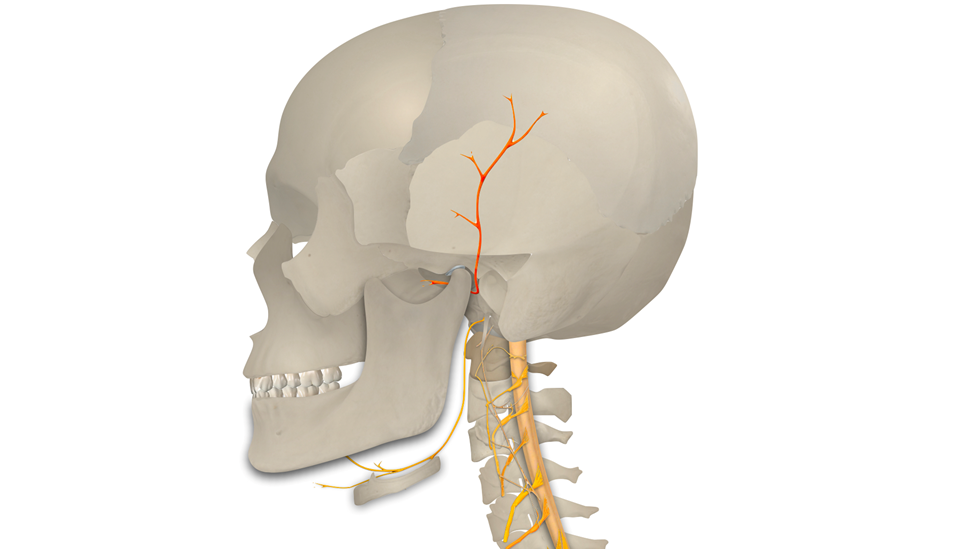Temporomandibular Joint (TMJ) disorder refers to a group of conditions affecting the jaw joint and the muscles controlling jaw movement. These disorders can cause pain in the jaw, face, and neck, along with difficulty in chewing and discomfort when opening or closing the mouth. TMJ disorders (TMD) may result from various factors, including misalignment of the teeth or jaw, trauma, arthritis, or habitual clenching or grinding of the teeth. Proper diagnosis and treatment are essential to alleviate symptoms and prevent further complications.
One of the most difficult challenges when it comes to TMD patients is correct diagnosis of their particular symptoms. There are numerous ways that TMD can present and nerve pain in various parts of the face, neck, head, shoulders and back. The face is innervated by numerous nerves that run and supply specific parts of the body and understanding their intricate anatomy is key to accurate diagnosis and treatment.
The auriculotemporal nerve is one of the nerves that can be affected in TMD. This nerve is a branch of the mandibular division of the trigeminal nerve (cranial nerve V3). In relation to the temporomandibular joint (TMJ) condyle, the auriculotemporal nerve typically runs posterior and slightly superior to the TMJ. It wraps around the neck of the mandibular condyle, passing between the condyle and the external auditory meatus.
This nerve provides sensory innervation to the TMJ, as well as to the ear, external acoustic meatus, and the skin of the temple. Because of its close proximity to the TMJ, the auriculotemporal nerve is often involved in referred pain associated with TMJ disorders.
The auricular nerve also carries autonomic fibers to the parotid gland. Damage to the auriculotemporal nerve can lead to several distinct signs and symptoms:
- Pain and Sensory Changes:
Pain: Patients may experience sharp or aching pain in the areas supplied by the nerve, particularly in the temple, ear, and side of the head.
Paresthesia: Tingling, numbness, or a “pins and needles” sensation might be felt in the temporal region, around the ear, and the scalp in the distribution area of the nerve.
Anesthesia: There may be a loss of sensation in the same areas, although this is less common.
- Frequent Headaches or Temporal Pain:
Temporal Headaches: Due to the sensory innervation of the temple area, damage to the auriculotemporal nerve can lead to persistent headaches localized to this region.
- Freye’s Syndrome (Gustatory Sweating):
Sweating while Eating: If the autonomic fibers of the auriculotemporal nerve are damaged or misdirected, patients may develop Frey’s syndrome, where they experience sweating, flushing, and warmth in the cheek and temple area while eating or thinking about food. This occurs because of the aberrant regrowth of parasympathetic fibers that originally innervated the parotid gland into sweat glands of the skin.
- Diminished or Absent Sensation in the External Ear and TMJ Area:
Loss of Sensation: The nerve also supplies parts of the auricle and external acoustic meatus, so damage may result in altered or reduced sensation in the ear, particularly the tragus and the anterior part of the auricle.
- Jaw or TMJ Pain:
Temporomandibular Joint (TMJ) Discomfort: Since the auriculotemporal nerve provides sensory innervation to the TMJ, damage can cause pain or discomfort in this area, which may be exacerbated by jaw movement.
- Dry Mouth (Xerostomia):
Reduced Salivation: While less common, damage to the autonomic fibers of the auriculotemporal nerve may also lead to reduced salivation from the parotid gland, contributing to a dry mouth.
These symptoms can arise from various causes such as surgical trauma (particularly involving the TMJ or parotid gland), infections, or even tumours affecting the nerve. In some cases of Temporomandibular Disorder, damage or pressure on the auriculotemporal nerve from a distally positioned condyle can also lead to symptoms.

